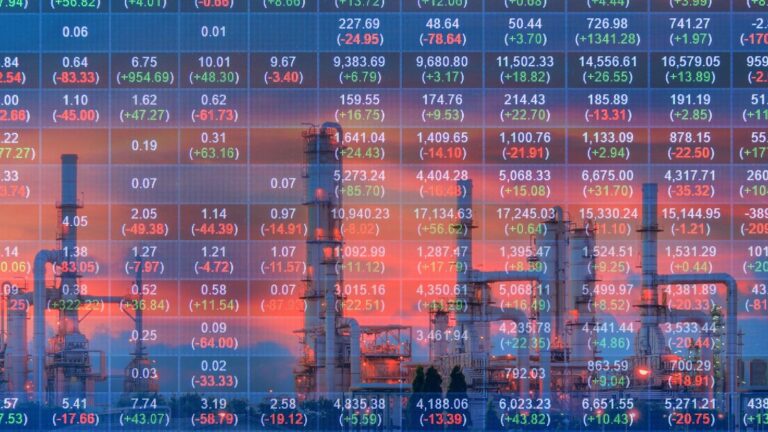Investors seeking an attractive yield should consider taking a closer look at an alternative to Kinder Morgan that offers a higher yield. Kinder Morgan represents a safe way to generate income, but it’s not the only option out there. We’ll explore why you should avoid Kinder Morgan, and discuss the smarter, higher-yielding alternative.
Overview of Kinder Morgan
Kinder Morgan is a leading energy infrastructure company that manages approximately 84,000 miles of pipelines and 180 terminals. The company not only transports and stores oil, natural gas and other products, but also engages in marketing activities. It operates in five segments: Natural Gas Pipelines; Carbon Dioxide; Terminals; Products Pipelines; and Kinder Morgan Canada.
Kinder Morgan has seen tremendous growth since its inception more than 20 years ago. Still, it has also faced several issues in recent years as the energy industry undergoes a major shift away from fossil fuels. The company is highly exposed to the roller-coaster nature of the oil industry. Its stock price has suffered in tandem with decreased demand for oil due to the shift toward alternative energy sources like wind and solar. Even though natural gas is expected to remain a major fuel source for some time, it is still vulnerable to drops in commodity pricing due to changing global market conditions. In addition, Kinder Morgan’s debt burden looms large as interest payments take up a sizable portion of its revenue each quarter.
Avoid Kinder Morgan and Buy This Superior, Higher-Yielding Alternative
One of the top stocks investors should consider avoiding is Kinder Morgan (KMI). The company’s debt level has been rising and its dividend is much lower than what many investors seek in a stock.
For those seeking an alternative, many solid, higher-yielding stocks are on the market. One of these is Enable Midstream Partners (ENBL). This master limited partnership offers investors a solid balance sheet with a healthy distribution yield of 8.44%.
Enable Midstream partners operates gathering and transport pipelines for both natural gas and crude oil. It owns and operates 19,000 miles of pipelines across 11 states in the U.S., making it one of the largest midstream service providers in the country. Enable Midstream Partners also owns a considerable logistics infrastructure including 4 processing plants, two large storage sites, 1 rail transportation facility and more than 1 million barrels of tank capacity.
The company’s fee-based assets make it extremely resistant to commodity price fluctuations as they benefit regardless if gas prices go up or down. This gives Enable Midstream Partners relatively consistent cash flows which are reflected in its strong credit ratings – an ‘BBB’ issuer rating from Fitch Ratings, BBB+ from S&P Global Ratings, and “baa2” from Moody’s Investor Service. The exceptional credit ratings allow the company to secure finance at highly favourable rates enabling it to pay generous distributions to shareholders that stand above those offered by Kinder Morgan (KMI). Additionally, Enable generated $552 million in distributable cash flow during 2019 — enough to cover its estimated 2020 distribution by 1.5 times — giving further confidence that its payout remains stable for investors looking for reliable income sources..
Reasons to Avoid Kinder Morgan
The stock of Kinder Morgan has seen a sharp decline in the value over the past few months. As a result, its dividend yield has also fallen from 5% to 3%, making it a less attractive investment option. Additionally, the company has been hit with numerous lawsuits and has faced regulatory challenges, making it a riskier investment. Therefore, investors should avoid Kinder Morgan and instead look for a superior, higher-yielding alternative.
High Debt
One of the main reasons why investors should avoid Kinder Morgan is the company’s high debt. As of 2019, the company held over $42 billion in long-term debt, a figure that is higher than many of its peers. This high debt load also impacts the company’s dividend policy as it often strains free cash flow. In addition, the high level of debt can also cause difficulty for the company during economic downturns. It can be more difficult to repay such large loans if reduced income is available. Therefore, it is important to note that investors should look into alternatives with lower debt levels if they are looking for a relatively safer investment option with higher yields.
Low Dividend Yield
Kinder Morgan (NYSE:KMI) has an extremely low dividend yield of just 1.50%. This is significantly lower than many other energy stocks, especially those with a similar track record and market capitalization. Moreover, the company’s dividend has stagnated since 2014, when many of its peers rewarded shareholders with rising dividends and stock buybacks. The lack of dividend growth has caused some investors to search for more attractive alternatives.
Investors searching for yield should also consider Kinder Morgan’s payout ratio, which is currently at 140%, one of the highest among pipeline companies. This means that the company is paying out more than it earns in profit (dividends cannot exceed profits). A high payout ratio can be detrimental to a company’s financial health, as there will not be enough cash to support capital expenditures or deal with unexpected costs or rising debts. As a result, investors should be mindful of Kinder Morgan’s current payout ratio before investing in the stock and may want to consider better-yielding companies with more sustainable dividend policies.

Poor Capital Allocation
Kinder Morgan has earned the wrath of investors for its poor capital allocation decisions. The company continues to allocate billions of dollars towards projects with poor returns and questionable long-term benefits because it takes on debt to finance them. This has driven its leverage ratio to historically high levels, raising concerns about its dividend payments’ sustainability and reducing expectations for long-term growth.
Furthermore, from an equity point of view, Kinder Morgan’s return on invested capital (ROIC) has decreased significantly over the past few years. Specifically, Kinder Morgan’s ROIC dropped from 8.6% at the end of 2018 to 7.5% in 2019, compared to an average ROIC of 10-12% for similar masters limited partnerships in its sector. This means that Kinder Morgan is not only able to generate lower returns than its peers but is also destroying shareholder value by diverting capital away from more profitable opportunities and putting it into less lucrative investments.
On top of this, despite a global economic slowdown triggered by COVID-19, Kinder Morgan has remained committed to investing billions in new projects, including several expansion projects involving natural gas pipelines which are unlikely to have significant returns over their lifetime due to increasingly bearish market conditions for natural gas prices. Such reckless investment decisions at a time when cash flow should be maximised is concerning from the perspective of forward-looking investors who want access to companies with strong fundamentals in energy infrastructure projects that are likely to yield consistent returns over time.
Reasons to Buy the Superior, Higher-Yielding Alternative
Investors looking for higher yields may be tempted to buy shares in Kinder Morgan, a lower-yielding energy company. However, there is a superior, higher-yielding alternative that investors should consider. Let’s take a look at the reasons why this alternative is preferable to Kinder Morgan. Here are the points we will cover:
Lower Debt
Kinder Morgan’s debt burden is quite large, and management has recently been tapped to pay down some of the debt with the proceeds from selling non-core assets. The sale proceeds will help reduce the firm’s total debt by an estimated $5 billion over the next 3 years. The reduced debt load should significantly improve Kinder Morgan’s financial stability, lower their interest payments and free up capital for future investments in additional oil and gas infrastructure projects.
By contrast, this alternative company has a much lower debt load. As a result, while it carries a higher dividend yield than that of Kinder Morgan, its superior cash flow generation capabilities allow for more conservative leverage management practices, reducing its interest rate risk and creating more financial stability.

This offers investors greater staying power in turbulent markets and helps ensure steady dividend growth over time even though the reported headline yield might not be as high as those offered by other firms who rely more heavily on borrowed capital to prop up their share prices.
Higher Dividend Yield
One of this superior alternative’s most notable and attractive features is its higher dividend yield. Dividend yield is calculated by taking the company’s annual dividend payments per share, divided by its share price. The higher the yield, the bigger return investors are likely to receive on their investment.
This particular stock currently offers a dividend yield substantially higher than that of Kinder Morgan Inc., making it especially attractive to investors looking for income-producing stocks. In addition, with each quarter end, there has been an increase in dividends paid out to shareholders which shows that the company is financially sound and capable of sustaining sustainable growth over time. Furthermore, even during market turbulence, this superior alternative has been able to maintain or even increase its dividend payments compared to when markets were healthy.
When compared against Kinder Morgan Inc., this superior alternative stands out due to its increased yield and its long history of reliably paying dividends and increasing payouts over time. Investors interested in income generating stocks with strong capital gains prospects should definitely consider this excellent investment option.
Superior Capital Allocation
Kinder Morgan, a leading energy infrastructure company, has been widely followed by investors. However, while its CEO has a long history of great capital allocation decisions, the company’s current state tells a different story. From overpaying for assets to issuing new equity to fund its investments, Kinder Morgan subpar capital allocation decisions have led to diminished returns and shareholder value destruction.
A superior alternative is Antero Midstream (NYSE:AM), an integrated midstream energy infrastructure company focused on serving mid- and large-cap exploration and production (E&P) companies in the Marcellus and Utica shales in Appalachia. Antero Midstream’s more disciplined management team prioritised returning cash flow to shareholders through dividend payments and equity repurchases. The combination of these two strategies should drive share price appreciation over time because of reducing shares outstanding and increasing income for shareholders.
Compared to Kinder Morgan, Antero Midstream offers healthier financials with higher yields, better operational efficiencies and presumably better capital allocation decisions in the future. A further look into the fundamentals reveals that while Antero Midstream is trading at lower valuations than Kinder Morgan on some metrics such as P/BV ratio and P/FCF ratio, it also commands higher dividend yields (7% vs 4%). Moreover, against high debt levels that weigh down its balance sheet leverage (3x), it effectively manages acquired debt by proactively refinancing or redeeming existing principal amounts before they are due when possible. Moreover it conservatively projects future cashflows even though many underlying markets are weakening under depressed commodity prices which should lead to stability in its finances even if pricing pressure persists in upstream markets.
Conclusion
After researching the pros and cons of investing in Kinder Morgan and the superior, higher-yielding alternative, it’s clear that the alternative is a better option for those looking for a steady and reliable source of income. The superior alternative has a more attractive yield and more sound fundamentals, making it a safer and more prudent option for investors. Furthermore, its dividend payment history is also more consistent and substantially more robust than that of Kinder Morgan.

Summary of Reasons to Avoid Kinder Morgan
All in all, you should avoid investing in Kinder Morgan, and instead opt for this superior, higher-yielding alternative.
By now it should be clear why investors should avoid Kinder Morgan and opt for a better-yielding high-quality investing alternative. As we have discussed, the company’s management team has been slow to respond to changing industry conditions, resulting in missed earnings forecasts and decreased dividend payments over the past few years. Furthermore, investors are exposed to wide fluctuations in Kinder Morgan’s stock price due to its volatile energy business and its complicated corporate structure. Lastly, the company is highly leveraged which further increases the risk of owning this equity. Therefore, we recommend that investors look for better opportunities with higher yields outside of KMI stock.
Summary of Reasons to Buy the Superior, Higher-Yielding Alternative
This article explains why you should avoid Kinder Morgan (NYSE: KMI) and consider a superior, higher-yielding alternative. In summary, the following points have been discussed:
1. Kinder Morgan is highly leveraged, resulting in a lending structure that makes them vulnerable to unexpected business downturns.
2. The company’s dividend yield of 4.3% is relatively low compared to industry averages and its competitors’ yields.
3. Its business model has been subject to significant volatility in the oil markets since its IPO in 2011, especially after 2014 when oil prices plummeted by more than 50%.
4. Kinder Morgan’s plans for expanding their operations have not panned out as expected. Instead, they have resulted in the company’s underperforming share price relative to its peers in the energy sector.
5. An alternative we recommend is Magellan Midstream Partners (NYSE: MMP) which has a higher yield at 8%, less leverage, and greater stability due to its focus on midstream assets such as liquids storage and transportation infrastructure versus exploration plays like KIM’s focus on oil/natural gas pipelines.
tags = avoid kinder morgan, kinder morgan comoany, energy source comoany, energy infrastracture company, oil and gas company, kinder morgan vs one ok, after 2.8b alibaba maliubloomberg, kinder morgan investors, oneok investors, midstream stocks, income investors




